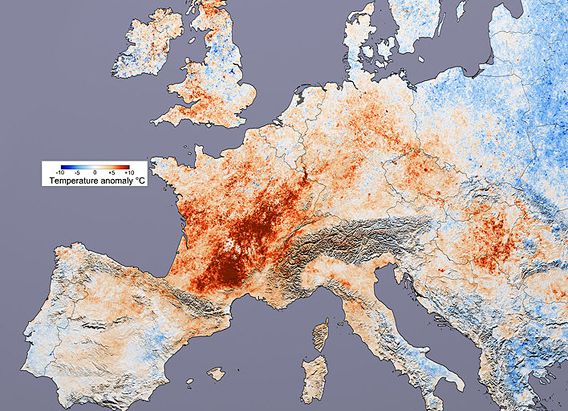
Hitting France especially hard, the Europe 2003 heatwave left tens of thousands of people dead. A new statistical analysis argues that climate change was the cause of this and other extreme summer heat events. Image by: NASA.
A recent rise in deadly, debilitating, and expensive heatwaves was caused by climate change, argues a new statistical analysis published in the Proceedings of the National Academy of Sciences (PNAS). Climatologists found that extreme heatwaves have increased by at least 50 times during the last 30 years. The researchers, including James Hansen of NASA, conclude that climate change is the only explanation for such a statistical jump.
“This is not a climate model or a prediction but actual observations of weather events and temperatures that have happened,” Hansen, a prominent scientist and outspoken climate change activist, wrote in an op-ed in the Washington Post. “Our analysis shows that it is no longer enough to say that global warming will increase the likelihood of extreme weather and to repeat the caveat that no individual weather event can be directly linked to climate change. To the contrary, our analysis shows that, for the extreme hot weather of the recent past, there is virtually no explanation other than climate change.”
Between 1981 and 2010, extreme heatwaves covered 10 percent of the world, according to the paper, which is 50 to 100 times greater than the 0.1 percent to 0.2 percent of the Earth’s surface covered by extreme heat from 1951-1980. The analysis not only finds that extreme heatwaves (defined as over three standard deviations above the base period) have expanded due to a warming world, but that moderate heat (over half of a standard deviation) has more than doubled: jumping from 33 percent to 75 percent. Many climatologists refer to this phenomenon as “loading the climate dice.”
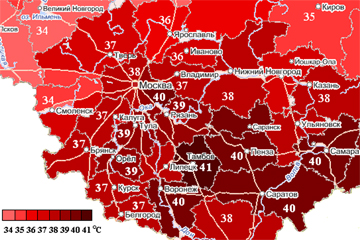
Russian temperatures at the end of July, 2010 painted parts of the country red. Photo by: Sergius Texmon. |
“In a normal climate without global warming, two sides of the die would represent cooler-than-normal weather, two sides would be normal weather, and two sides would be warmer-than-normal weather. Rolling the die again and again, or season after season, you would get an equal variation of weather over time,” Hansen explains in his op-ed. But now he says, climate change has shifted the dice: instead of only two sides being warmer than average, it should be four sides with one of those sides representing extreme heat.
“The climate dice are now loaded to a degree that a perceptive person old enough to remember the climate of 1951–1980 should recognize the existence of climate change, especially in summer,” the scientists write in the PNAS paper. Given their findings, the researchers also argue it is safe to say that recent heatwaves—like last year’s drought in Texas and Oklahoma, Russia’s heatwave and wildfires in 2010, and the European heatwave of 2003—were caused by climate change.
“[These events] almost certainly would not have occurred in the absence of global warming with its resulting shift of the anomaly distribution,” the scientists write. “In other words, we can say with high confidence that such extreme anomalies would not have occurred in the absence of global warming.”
Europe’s heatwave in 2003, which was the continent’s hottest summer since at least 1540, led to 70,000 deaths above the summer average. Likewise, Russia’s 2010 heatwave increased the mortality rate by 56,000, and helped spawn massive wildfires destroying one-fifth of the country’s globally-important wheat crop. Meanwhile, last year’s drought in the Southern U.S. cost the state of Texas, where it was most severe, over $7 billion in damages.
The scientists write that while local weather conditions obviously play a role in all extreme weather events, climate change has become a game-changer.
“It is not uncommon for meteorologists to reject global warming as a cause of these extreme events, offering instead a meteorological explanation. For example, it is said that the Moscow heat wave was caused by an extreme atmospheric ‘blocking’ situation, or the Texas heat wave was caused by La Niña ocean temperature patterns,” the researchers write. “Certainly the locations of extreme anomalies in any given case depend on specific weather patterns. However, blocking patterns and La Niñas have always been common, yet the large areas of extreme warming have come into existence only with large global warming.”
With such findings, Hansen told the Associated Press that the current heatwave and drought across wide-swathes of the U.S. is also likely linked to climate change.
Although bold, the findings of the PNAS paper are by no means alone. Over the past few years, climatologists have increasingly found connections between extreme weather events and climate change. A recent study found that warming in the Indian and Pacific oceans likely increased drought conditions across East Africa, while another found that climate change had increased the odds of the Russian heatwave by 20 times. But it was not just summer temperatures: another study found that climate change made an abnormally warm November in Britain last year 60 times more likely.
Experts say the only way to combat climate change is to aggressively cut global carbon emissions, which hit record levels last year. Currently, carbon is emitted primarily by burning fossil fuels, such as coal, oil and natural gas. In addition, the destruction of forests, peatlands, mangroves, and other ecosystems release stored carbon into the atmosphere, worsening the situation. While most of the world’s nations have agreed to tackle climate change, to date actions have done little to slow emissions growth. At current rates emissions are projected to double from pre-industrial levels by 2050.
CITATION: James Hansen, Makiko Sato, and Reto Ruedy. Perception of climate change. PNAS. 2012. www.pnas.org/cgi/doi/10.1073/pnas.1205276109.
Related articles
Climate change increased the probability of Texas drought, African famine, and other extreme weather
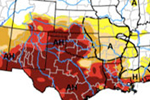
(07/11/2012) Climate change is here and its increasing the chances for crazy weather, according to scientists. A prestigious group of climatologists have released a landmark report that makes the dramatic point that climate change is impacting our weather systems—and in turn our food crops, our economies, and even our lives—here-and-now. The new report in the American Meteorological Society is first of what is intended to be an annual offering that will attempt to tease out the connections between climate change and individual extreme weather events, such as heatwaves, droughts and floods.
As U.S. sees record heat, extreme weather pummels 4 continents
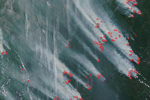
(07/10/2012) It’s not only the U.S. that has experienced record-breaking extreme weather events recently, in the last couple months extreme weather has struck around the world with startling ferocity. In addition to the much-covered heatwaves, wildfires, and droughts in the U.S., killer floods struck India, the worst drought yet recorded plagued South Korea, and massive forest fires swept through Siberia to name just a few.
Prominent climate skeptic reverses course, says global warming worse than IPCC forecast
(07/30/2012) After starting his own project to study global warming, a once-prominent climate change skeptic and physicist says he now accepts the reality of anthropogenic climate change. “Last year, following an intensive research effort involving a dozen scientists, I concluded that global warming was real and that the prior estimates of the rate of warming were correct. I’m now going a step further: Humans are almost entirely the cause,” Richard Muller writes in the New York Times as his team, the Berkeley Earth Project, releases a new paper that finds an even stronger link between greenhouse gas emissions and rising temperatures worldwide than the Intergovernmental Panel on Climate Change (IPCC).
Scientist: ‘no doubt’ that climate change is playing a role in U.S. fires
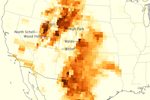
(07/02/2012) A noted climate scientist says there is ‘no doubt’ that climate change is ‘playing a role’ in this year’s series of record fires in the western U.S. A massive wildfire in Colorado has forced the evacuation of 36,000 people, destroyed over 300 homes, and killed two people. The devastation wrought by the Waldo Canyon Fire even prompted a visit form U.S. President Barack Obama. But this is not the only epic fire in the U.S. this year: less than a month before the Colorado disaster, New Mexico experienced its largest fire on record in Gila Nation Forest; the conflagration burned up 247,000 acres (100,000 hectares). Other major wildfires have occurred in Utah and Wyoming, as well as other parts of New Mexico and Colorado.
Borneo’s forests face dire future from global warming
(07/18/2012) Already wracked by extensive deforestation and forest degradation, the future looks grim for Borneo’s tropical rainforests, reports a new study published in the Journal of Geophysical Research-Biogeosciences.
Scientists: iron fertilization could be a big climate help
(07/18/2012) For a long time, oceanic iron fertilization was seen as a promising mechanism to combat global climate change. But then in 2009 a well-publicized study found that iron fertilization stored 80 times less carbon than expected, dampening enthusiasm and support around the geoengineering scheme. Now, however, the idea of fertilizing the ocean with iron may be back: a new study in Nature reports that iron fertilization, in the right conditions, could store carbon in the deep ocean for centuries.
Republican stalwart calls global warming ‘a matter of fact’, pushes for carbon tax
(07/13/2012) Former Secretary of State George Shultz is calling for a carbon tax to reduce U.S. greenhouse gas emissions and oil consumption, according to an interview released today by Stanford University.
2,600 scientists: climate change killing the world’s coral reefs

(07/10/2012) In an unprecedented show of concern, 2,600 (and rising) of the world’s top marine scientists have released a Consensus Statement on Climate Change and Coral Reefs that raises alarm bells about the state of the world’s reefs as they are pummeled by rising temperatures and ocean acidification, both caused by greenhouse gas emissions. The statement was released at the 12th International Coral Reef Symposium.
Scientists give world leaders ‘Fs’ on climate change, biodiversity, and desertification

(06/19/2012) It seems world leaders may need to retake environmental studies. As the Rio+20 Summit on Sustainable Development opens, the scientific journal, Nature, has evaluated the progress made on three treaties signed at the Rio Earth Summit in 1992: climate change, biodiversity decline, and desertification. Unfortunately the publication gives progress on all three treaties an ‘F’, highlighting how little progress has been made on the global environmental crisis.
Experts: ignoring climate change at Rio+20 makes other goals “meaningless”

(06/18/2012) The Climate Change Task Force (CCTF)—made up of 30 climate scientists, other experts and world leaders—warned today that sidelining climate change at the Rio+20 Summit on Sustainable Development threatened progress on the conference’s other goals, which includes combating poverty and building economies that value nature. “I am very concerned and worried because the draft final document of the Rio+20 conference does not give proper attention to climate change,” says former Russian President Mikhail Gorbachev in a press statement.
Scientists: if we don’t act now we’re screwed

(06/07/2012) Scientists warn that the Earth may be reaching a planetary tipping point due to a unsustainable human pressures, while the UN releases a new report that finds global society has made significant progress on only four environmental issues out of ninety in the last twenty years. Climate change, overpopulation, overconsumption, and ecosystem destruction could lead to a tipping point that causes planetary collapse, according to a new paper in Nature by 22 scientists. The collapse may lead to a new planetary state that scientists say will be far harsher for human well-being, let alone survival.
Want to stop climate change: buy fossil fuel deposits
(06/07/2012) Governments, NGOs, and others fighting climate change should consider buying coal and oil deposits—not to exploit them, but to keep them from being exploited, according to a bold new policy paper in the Journal of Political Economy. Economist Bard Harstad with the Kellogg School of Management argues that climate coalitions could quickly slash carbon emissions by purchasing and conserving marginal fossil fuel deposits, a strategy that would solve the current problem of carbon leakage, i.e. when cutting emissions in one place pushes others to burn more elsewhere. Given that carbon emissions rose to a new record last year—31.6 gigatons—and carbon has hit 400 parts per million (ppm) in the atmosphere for the first time in at least 800,000 years, Harstad’s analysis comes at a time when scientists are warning that urgent and bold action is needed to mitigate global climate change before it becomes irreversible.







